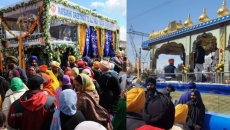VANCOUVER - The garbage trucks moved slowly down Hastings Street, to the shouts and protests of residents of a homeless encampment on the sidewalks of Vancouver's Downtown Eastside.
Into the compactors went tents, suitcases, mattresses and furniture, crushed with bags of garbage and other detritus.
The implementation of a city decree to clear the encampment on Wednesday, backed by dozens of a police, was met with frustration from residents and their advocates who wonder where they'll sleep next, even as the city says it's too unsafe to stay.
Police and city staff rolling rubber tubs labelled "personal belongings" arrived on Hastings Street on Wednesday to dismantle about 80 tents and other structures that lined the sidewalks.
Residents scrambled to take down tents and pack as trash and belongings were scattered.
Officials said the encampment had become a significant safety and fire hazard and, without intervention, it was a matter of time before people died.
At the heart of the encampment, at the corner of Columbia and East Hastings, resident swore at police and chanted "stop the sweeps."
To ensure the life and safety of all residents and the surrounding community, the decision has been made to bring the East Hastings encampment to a close today. Shelter space is available to those currently residing on Hastings St.
— Mayor Ken Sim (@KenSimCity) April 5, 2023
As we move forward, we will continue to work… pic.twitter.com/N1UyrOdwPU
Some yelled and cried while others begrudgingly packed but pledged to return.
Jason Rondeau lives at the encampment and said residents have been "constantly battling with the city.”
“I have had to replace my stuff, all of my belongings, five times this year alone,” he said, pointing to a pile of luggage he packed as the police moved in.
Rondeau said when city staff come to his tent, he planned to say "yes sir, have a good day,” to ensure there was as little friction possible.
But he said he would return "because as soon as the cops are leaving, I am coming back."
Rondeau called the sweep a waste of taxpayers’ money. He said he had been offered a shelter spot three times this year but that option was worse than his spot on the sidewalk.
Ken Johns, who spent 18 months in a tent before finding a spot at a rooming house, said the community is heartbroken after losing their homes.
“That’s where they go to sleep, that’s where they feel safe. When you take that away and you force them into a shelter or a (rooming house) and they don’t feel safe. (It's) just re-traumatizing them and making it hard for them to get ahead,” he said.
While the camp was being dismantled, Vancouver Mayor Ken Sim held a news conference and told reporters that the longer the street camp continued, the higher the odds people would lose their lives and even more would lose their homes to the growing fire hazard.
"Every day, we are hearing new and sometimes horrific stories: theft, vandalism, senseless acts of violence, violence against women, and more specifically, violence against Indigenous women," he said.
Fire Chief Karen Fry said the risk at the encampment had become worse since she issued an order in July of last year to shut the camp over the fire hazard.
There have been 16 tent fires this year alone that injured four people, she said, and 1,600 propane tanks have been seized since the fire order was issued.
"Since 2019, this area alone has had an increase of 340 per cent of outdoor fires. This persistent fire risk posed by the encampments and recent fires in the neighbourhood has made the situations of East Hastings Street even more precarious," Fry said.
Police Chief Adam Palmer said it was increasingly challenging to keep people safe in the area.
"The Downtown Eastside encampment is fraught with serious crime, violence and dangerous weapons, which have proliferated in this neighbourhood. Street-level assaults within the encampment have increased 27 per cent and nearly half of those are being committed by strangers."
He said 19 police officers have been assaulted, some very seriously.
At its peak, there were about 180 structures in the encampment. The city said in a statement that 600 tents and makeshift buildings have been removed from the area.
Johns said now he was “privileged enough” to have a roof over his head at his rooming house, but the living conditions were not much better than on the streets.
“None of them are like an actual apartment building where everything is clean. People are getting bitten by bugs, people have to deal with mice droppings,’ he said.
He said money used for the sweep should go toward an actual camp to house people.
“Why don't they have the money to set up an area where we can have an actual homeless camp? Set up the infrastructure, set up portable toilets, set up electricity, all that kind of stuff,” he said.
Vincent Tao, an organizer with the Vancouver Area Network of Drug Users, said the organization found only two shelter beds available tonight, leaving people living in tents with nowhere else to go.
“And so the problem will continue to happen as long as there is no housing being opened, and where are people supposed to go? They will come right back onto the block,” he said.
Vancouver city manager Paul Mochrie acknowledged there aren’t enough empty shelter spaces to accommodate everyone being told to leave the encampment but said many have been declining shelter options for months.
"The odds of us being able to provide 100 shelter spaces today, we couldn't commit to that. What we would do if it wasn't available today is we would work to get people into shelter or other housing that comes online as quickly as possible," he said.
"So, anyone on Hastings today who's seeking indoor options, if we can't provide it today, we will be staying connected with those people and working to get them inside as quickly as we can."
He said in the next couple of months more than 300 spaces will become available, including renovated rooming houses and temporary modular units constructed on city property in partnership with B.C. Housing.
Tent communities in Vancouver have been common.
In April two years ago, Public Safety Minister Mike Farnworth told campers at the city’s Oppenheimer Park that they could leave or choose to accept the housing they were offered. More than 200 campers had been living in the park for months, after they were kicked out of Crab Park.
Many of those campers then moved on to nearby Strathcona Park, which was also shut down months later after complaints of escalating crime.
Pivot Legal Society, which advocates for those on the Downtown Eastside, called the dismantling of the Hastings Street site a “gross human rights violation.”
“There is nowhere for people to go,” it says in a tweet. “(This is) a massive waste of public resources and a dangerous ploy to pretend to be doing something.”
Former Vancouver mayor Kennedy Stewart also referred to the situation when he tweeted that a new mayor and council had been elected "who today abandoned our attempts to reconcile with Indigenous people and resume traditional genocidal practices. Welcome to cruel Vancouver."
The decision to remove the Hastings Street camp comes despite a B.C. Supreme Court order from Justice F. Matthew Kirchner, who said Vancouver's park board wasn't justified in issuing two eviction orders for those living in Crab Park.
Kirchner found the orders unreasonably assumed there were enough indoor shelter spaces to accommodate campers who had been forced out.
Similar court orders have since been made allowing camps to remain in Victoria and Prince George.
EARLIER STORY:
Vancouver police have dispatched officers to a tent encampment on the city's Downtown Eastside with the aim of shutting down the site to campers.
The City of Vancouver says it has asked police to help bring a close to the encampment, removing all remaining tents and structures.
It says in a statement that it decided to act due to "the growing public safety risk" posed by the encampment on East Hastings Street.
It says the city has been working on the street daily to address fire, life and safety concerns identified by the fire chief's safety order issued in July last year.
There have been several recent fires at the camp, and the city says Vancouver police have reported a nine per cent increase in assaults in the area since the encampment began.
It says police have also identified an "alarming trend" of sexual violence in the area.






